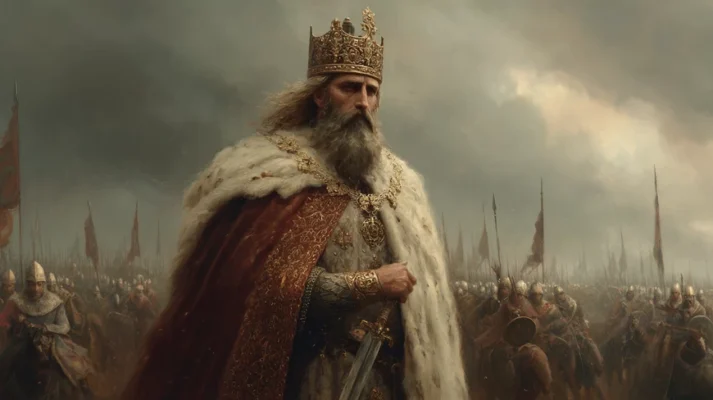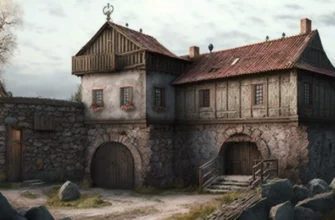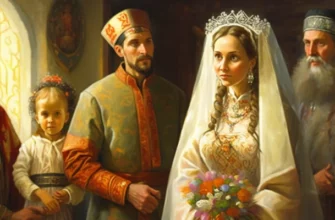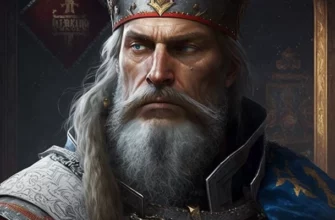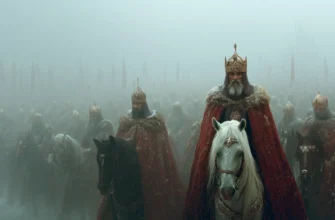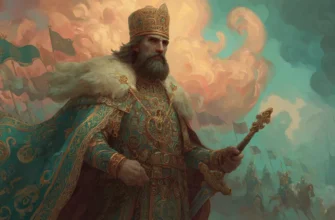Kniaz Sviatoslav was one of the most famous rulers of tenth-century Kyivan Rus. He was the son of Kniaz Igor and Princess Olga and managed to strengthen and expand the state. Sviatoslav is known for his numerous military campaigns, including against the Khazar Khaganate, Byzantium, and tribes in the Danube lands. His military skill and courage made him a legendary warrior of his time. Sviatoslav had a significant impact on the development of Kievan Rus, enhancing its international prestige and laying the foundation for the further prosperity of the state. His activities left a deep mark on the history of Ukraine and neighboring nations.Table of contentsBiography of Prince SviatoslavPolitical activityMilitary campaignsCampaigns against the Khazar KhanateWars with ByzantiumCampaigns on the Danube landsMilitary tactics and strategy of SvyatoslavThe importance of Prince Svyatoslav for the history of Kievan RusLiterary and historical sources about SvyatoslavConclusionsTable of contents
- Biography of Prince Svyatoslav
- Political activity
- Military campaigns
- Campaigns against the Khazar Khaganate
- Wars with Byzantium
- Campaigns on the Danube lands
- Sviatoslav’s military tactics and strategy
- The importance of Prince Sviatoslav for the history of Kievan Rus
- Literary and historical sources about Sviatoslav
- Conclusions
Biography of Prince Svyatoslav
Svyatoslav Ihorovych was born around 942 in the family of Kniaz Ihor and Princess Olha, prominent rulers of Kievan Rus. Raised under the influence of his mother, who carried out significant reforms in the state, Sviatoslav showed an interest in military affairs from an early age. After the death of his father in 945, he inherited power and began active political and military activities.
Sviatoslav is known as an energetic and tough ruler who sought to expand the borders of Kievan Rus. He led a number of successful campaigns, especially against the Khazar Khaganate, which significantly strengthened the state’s position in the south. The prince also fought against Byzantium and steppe tribes, securing control over important trade routes.
Sviatoslav died in 972 during a campaign to the Bulgarian lands, but his legacy left a significant impact on the further development of Kievan Rus. He is considered one of the greatest military leaders and state-builders in Eastern Europe.
Political activity
Sviatoslav Ihorovych actively worked to strengthen and expand Kyivan Rus. His main goal was to unite the Slavic lands under his rule and control important trade routes, which ensured the economic development of the state.
The Kniaz led several large-scale military campaigns that significantly expanded the territory of Kievan Rus. The most famous were the campaigns against the Khazar Khaganate, which destroyed its influence on the southern borders. Sviatoslav also fought wars with Byzantium, trying to control the Danube Delta and the Black Sea coast.
Svyatoslav’s policy was aimed at strengthening the international authority of Rus. He maintained diplomatic relations with neighboring states, but most often resolved issues by force of arms. His active foreign policy laid the foundation for the further prosperity of Kievan Rus.
Kniaz Sviatoslav Ihorovych continued the work of his predecessors in uniting scattered Slavic tribes and territories under the rule of Kyiv. He strengthened the central government by conquering or concluding vassalage agreements with numerous tribes, including the Poles, Derevlyans, Vyatichi, Croats, and others.
Sviatoslav paid special attention to controlling important trade routes, in particular the route “from the Varangians to the Greeks” that connected the Baltic and Black Seas. The unification of the lands under a single leadership not only strengthened the military power of the state, but also contributed to the development of trade and culture.
Thanks to his military campaigns and political alliances, Sviatoslav laid the foundation for the further centralization of Kievan Rus, which became one of the most influential states in Eastern Europe.
Military campaigns
Kniaz Svyatoslav Ihorovych is known as an outstanding warrior and commander who led a number of large-scale military campaigns that significantly expanded the territory of Kievan Rus. One of the most famous was the destruction of the Khazar Khaganate, a powerful state that had long controlled the southern borders of Rus. This campaign gave Kyiv access to strategic trade routes and strengthened its position in the south.
Sviatoslav also campaigned against the Byzantine Empire, seeking to control the Danube Delta and the Black Sea coast. The wars with Byzantium were difficult, but they showed the prince’s determination and military skill.
In addition, Sviatoslav fought battles with the steppe tribes of Pechenegs and Bulgarians, trying to consolidate the influence of Kievan Rus in the Danube region. His campaigns strengthened the international authority of the state and created conditions for the further prosperity of Rus.
Campaigns against the Khazar Khaganate
Kniaz Sviatoslav Ihorovych led several decisive campaigns against the Khazar Khaganate, a powerful state that had long controlled the southern borders of Kievan Rus and important trade routes. In 965, Sviatoslav inflicted a crushing defeat on the Khazars, destroying their capital, the city of Ithil.
This campaign led to the complete decline of the Khazar Khanate and opened up access to the Black Sea and control over important trade routes, including the route “from the Varangians to the Greeks,” for Kievan Rus. The destruction of the Khazar state was one of Sviatoslav’s most significant military victories and cemented his status as a strong and ambitious ruler.
Wars with Byzantium
Kniaz Svyatoslav Ihorovych waged several military campaigns against the Byzantine Empire, seeking to consolidate control over strategically important territories on the northern coast of the Black Sea. The main goal was the Danube Delta, a key region for controlling trade routes between the Baltic and the Mediterranean.
The wars with Byzantium were brutal and long. Sviatoslav initially entered into an alliance with Byzantium to fight against the Khazars, but later conflicts arose between the parties over control of the conquered lands. The Byzantines repeatedly tried to weaken the prince’s position, but his military skill and courage allowed Kievan Rus to maintain influence in the region.
Although the wars with Byzantium did not always end in complete victory, they strengthened Sviatoslav’s international authority and demonstrated the strength of Kievan Rus in foreign policy.
Campaigns on the Danube lands
Kniaz Sviatoslav Ihorovych conducted several important campaigns to the Danube lands, seeking to expand the influence of Kievan Rus in the Danube region. This region was of great strategic importance because of its control over trade routes between East and West.
In 968, Sviatoslav captured important Bulgarian cities on the lower Danube, which challenged the Byzantine Empire. He established military bases there and tried to assert the power of Rus, but faced fierce resistance from local Bulgarians and their allied troops.
The campaigns to the Danube lands showed Sviatoslav’s ambitions to expand the state and establish control over key territories. Although these campaigns were difficult and ended in tragedy for the prince, they left a significant mark on the history of Kievan Rus.
Sviatoslav’s military tactics and strategy
Kniaz Svyatoslav Ihorovych was a talented commander who combined the traditions of the Slavic army with the skills of warfare borrowed from nomadic tribes. He actively used rapid maneuvers, surprise attacks, and coordinated cavalry actions, which allowed him to win victories even over numerically superior enemies.
Sviatoslav paid special attention to the mobility of his troops – he often used the tactics of swift raids and surprise attacks, avoiding long sieges. His troops consisted of well-trained vigilantes who were loyal and disciplined soldiers.
The prince’s strategy was to simultaneously pursue an active foreign policy, expanding his territories, and maintain control over key trade routes. This balance of warfare and diplomacy ensured Kievan Rus’ strong position in the region.
In general, Sviatoslav’s military tactics and strategy laid the foundation for the further development of military affairs in Kievan Rus.
Kniaz Sviatoslav’s army was well organized and disciplined. It was made up of vigilantes, professional warriors loyal to the prince and ready for long campaigns. They were armed with spears, swords, bows, and shields, and wore light armor, which allowed them to remain mobile in battle.
The peculiarity of Sviatoslav’s army was a combination of foot and cavalry warfare. The cavalry provided speed and maneuverability, which gave an advantage in sudden attacks and ambushes. The infantry held positions and performed the main combat function in frontal battles.
Sviatoslav also actively used the fleet – light boats for crossing rivers and making quick raids along water bodies. This allowed him to wage war over large areas and maneuver quickly.
In general, Sviatoslav’s army was mobile, well-trained, and able to operate effectively in various conditions, from forests and swamps to steppes and river valleys.
Kniaz Svyatoslav Ihorovych had a significant impact on the development of military affairs in Kievan Rus and the region as a whole. His successful campaigns demonstrated the effectiveness of mobile tactics, the combination of cavalry and infantry, and the importance of quick maneuvers and surprise attacks.
Sviatoslav popularized the use of light weapons and the navy to fight in a variety of landscapes, from river valleys to open steppes. His approaches became a model for future generations of Russian warriors and helped improve the military organization.
Thanks to his activities, Kievan Rus gained a reputation as a strong and unyielding military force, which influenced the balance of power in Eastern Europe. Sviatoslav’s military reforms and strategic innovations laid the foundation for the further development of the state’s army.
The importance of Prince Sviatoslav for the history of Kievan Rus
Kniaz Svyatoslav Ihorovych played a key role in the formation and strengthening of Kievan Rus as a powerful state of the tenth century. His military campaigns greatly expanded the state’s territory, destroying threatening neighbors such as the Khazar Khaganate and securing control of important trade routes.
Svyatoslav strengthened the central government by uniting the disparate Slavic tribes under a single leadership, which contributed to the stability and further development of the state. His active foreign policy raised the international profile of Kievan Rus and strengthened its position in the region.
Svyatoslav’s legacy became the foundation for the prosperity of Kievan Rus under subsequent princes, and his image as a brave warrior and statesman remained in the memory of the peoples of Eastern Europe.
During the reign of Prince Sviatoslav, Kievan Rus significantly expanded its borders. Thanks to his successful military campaigns against the Khazar Khaganate, he eliminated this powerful center of power in the south, opening access to the Black Sea.
Svyatoslav also conquered important lands in the Danube region, establishing Rus’ influence in the region. He conquered numerous Slavic and Turkic tribes, which helped to strengthen the centralized power of Kyiv.
Thus, the expansion of territories under Sviatoslav’s leadership created a solid foundation for the further development and unification of Kievan Rus into one of the most influential states in Eastern Europe.
Kniaz Sviatoslav Ihorovych significantly strengthened Kievan Rus as a political and military force. He strengthened the centralized government by subduing numerous tribal associations and securing their loyalty. This contributed to stability and order within the state.
Svyatoslav also consolidated control over key trade routes, which strengthened the economic basis of Rus. An active foreign policy and military successes increased Kyiv’s prestige among neighboring nations and states.
Thanks to these measures, Kievan Rus became a stronger, more cohesive, and influential state, ready for further development and expansion.
Literary and historical sources about Sviatoslav
The main source of information about Prince Svyatoslav is the Tale of Bygone Years, an ancient Russian chronicle that describes in detail his life, military campaigns, and political activities. This text is one of the most important historical documents of Kievan Rus.
In addition, Byzantine chronicles, as well as Arabic and Byzantine sources, mention Sviatoslav, confirming his active participation in international relations at the time.
Archaeological finds, such as military equipment and the remains of settlements, also complement the picture of his era and confirm the scale of his campaigns.
Thanks to these sources, the image of Sviatoslav has been preserved in history as one of the most prominent rulers of Kievan Rus.
In addition to the Tale of Bygone Years, Sviatoslav is mentioned in numerous medieval chronicles and chronicles of neighboring nations, including Byzantine historians Leontius Mahalat, Constantine VII the Crimson, as well as Arab and Persian writers who described events on the borders of Kievan Rus.
Archaeological excavations are also an important source, providing insight into military equipment, fortresses, and settlements of the time. This material evidence helps to confirm information from written sources.
In addition, the image of Sviatoslav has been preserved in oral folklore – epics and legends that have been passed down from generation to generation and emphasized his role as a brave warrior and statesman.
Conclusions
Kniaz Sviatoslav Ihorovych occupied a special place in the history of Kievan Rus as an outstanding warrior and statesman. His reign was marked by a significant expansion of the state’s territories through successful military campaigns against the Khazar Khaganate, Byzantium, and numerous steppe tribes. These campaigns not only strengthened Rus’ borders but also opened access to important trade routes, which became the basis for further economic development.
Sviatoslav helped to unite the scattered Slavic lands by strengthening the centralized power of Kyiv, which created a more stable and organized state. His war tactics and strategy were innovative for his time, combining the mobility of cavalry with the discipline of vigilantes, which allowed him to achieve significant military success even in unequal battles.
Sviatoslav’s political activity contributed to the international prestige of Kievan Rus. He was able to combine the power of arms with diplomacy, strengthening the state’s position among other powerful empires and nations of the time.
The legacy of Kniaz Sviatoslav became an important foundation for the further development of Kievan Rus, its consolidation and prosperity in the following centuries. His image as a brave warrior and far-sighted ruler has long been imprinted in the historical memory of the peoples of Eastern Europe and still remains a symbol of courage and state will.
